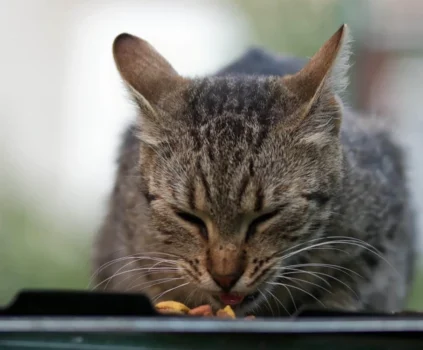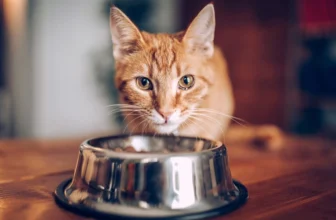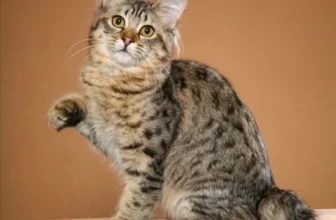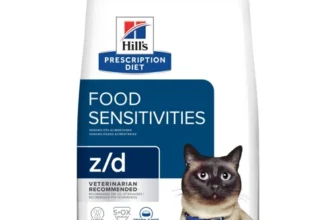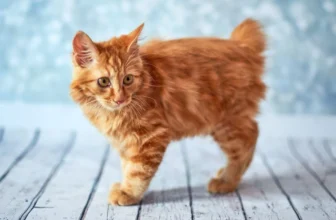As pet parents, we always strive to provide the best possible care for our furry friends, especially when it comes to their diet. One of the trending diets lately is the Grain-free diet. However, with the vast amount of information and opinions out there, it can be challenging to determine if it’s the right choice for your American Bobtail cat. In this article, we’ll delve into the pros and cons of a Grain-free diet for American Bobtails, as well as the things to consider before making the switch. Let’s learn and explore this dietary trend together!
Understanding Grain-free diet
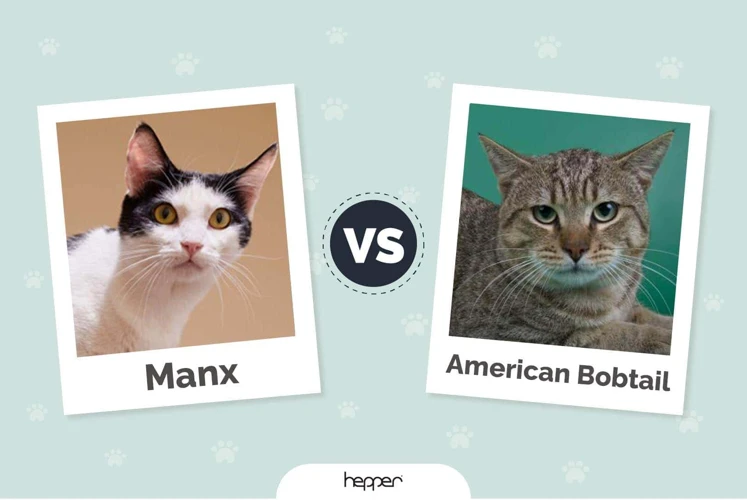
Understanding what is good or bad for American Bobtail cats is something that every pet owner should be concerned about. When it comes to the type of diet, grain-free is one of the newest trends available for American Bobtail cats. Grain-free diets are free from grains like wheat, barley, corn, and rice, and usually contain high-quality protein sources like fish, chicken, and turkey. But what does a grain-free diet mean for your American Bobtail cat? Is it always beneficial? In this section, we will delve deeper into understanding grain-free diets, including the reasons for their existence and their importance compared to other types of diets.
What is Grain-free?
Grain-free diet refers to cat foods that do not contain any grains such as wheat, corn, rice, or barley. Instead, they are made up of protein sources, vegetables, and fruits. These diets are gaining massive popularity among cat owners worldwide; however, it is vital to understand that not all grains are bad for your feline friend as some are essential sources of vital vitamins, minerals and fiber.
Grain-free diets for cats are commonly marketed as being healthier, more natural, and better for digestion. For this reason, it is not surprising to see why more cat owners are choosing grain-free foods for their American Bobtails. However, it is important to note that not all cats might need a grain-free diet. Keeping that in mind, let’s take a closer look at why grains are removed from cat diets and the benefits and concerns of grain-free food for your American Bobtail cat.
| Grains in Cat Food: | Benefits: |
|---|---|
| Wheat: | Good source of protein and fiber |
| Corn: | Important source of carbohydrates, antioxidants, and essential fatty acids. |
| Rice: | Good source of energy and easy to digest |
| Barley: | High in vitamins, minerals, and fiber |
While grains can be beneficial when included in a balanced diet for cats, some cats may develop allergic reactions from consuming them. Grain-free diets help eliminate such negative reactions. They also provide a single source of protein that may be beneficial in eliminating an allergic reaction. However, it is important to note that simply switching to a grain-free diet may not fix all allergic reactions in American Bobtails, and a veterinarian should always be consulted in such cases.
A grain-free diet refers to cat food that does not contain grains such as wheat, barley, corn, and rice. While some grains are essential sources of vital vitamins, minerals and fiber, some cats may develop allergic reactions from consuming them. Grain-free diets have become increasingly popular among cat owners, and it is important to understand both the pros and cons before making any dietary changes for your American Bobtail. Protein is especially important when it comes to choosing the right diet for your American Bobtail, as it is necessary for healthy development and maintaining a healthy weight.
Why Grain-free?
Many pet owners have started to notice the benefits of switching to grain-free diets for their pets. Grain-free diet eliminates common allergens and fillers which compromise the health of cats, hence making it a healthier option for pets. In particular, American Bobtail cats can benefit from a grain-free diet due to their unique dietary needs.
Here are some more reasons why switching to a grain-free diet may be beneficial for your American Bobtail:
| Reasons to choose grain-free | Brief explanation |
|---|---|
| High-quality protein source | A grain-free diet for cats usually has high-quality protein sources such as real meat, fish, and poultry as the main ingredients, which is necessary for their muscle growth and development. |
| Lower risk of food allergies | Cats are obligate carnivores, and some grains can be difficult for them to digest. This can lead to food allergies and intolerances, which can cause skin irritation, gastrointestinal issues, and other health problems common among American Bobtail cats. The absence of grains from the cat’s diet can lower the risk of these allergies. |
| Low carbohydrate content | Unlike human diets, cats have a low carbohydrate tolerance. A grain-heavy diet can trigger insulin resistance, obesity, and diabetes in American Bobtail cats. A grain-free diet, on the other hand, has a lower carbohydrate content, which is more appropriate for feline digestive systems. |
| Natural and nutrient-rich ingredients | Grain-free cat food is formulated with natural and nutrient-rich ingredients such as fruits, vegetables, and herbs, which can provide microbiome support, aid digestion, and boost immunity in American Bobtail cats. |
By switching to a grain-free diet, American Bobtail cats can enjoy excellent health benefits without having to compromise on taste. However, it’s always best to consult with a veterinarian before making any significant dietary changes to ensure that the cat’s nutritional needs are being met. If you want to learn more about American Bobtail cat nutrition, click here.
Pros of Grain-free diet for American Bobtail
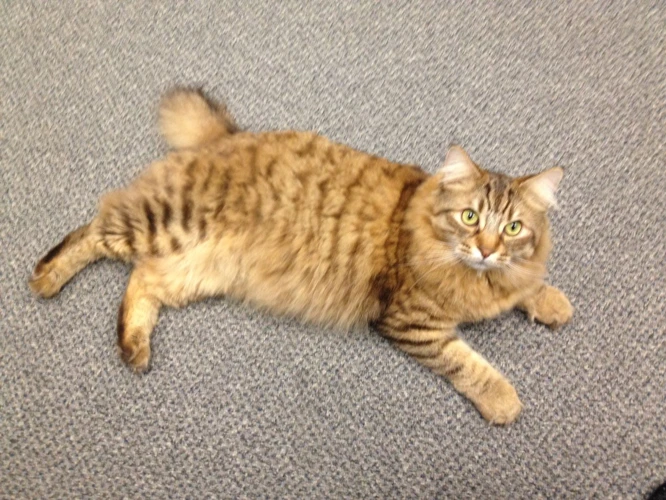
As pet parents, it is essential to provide our American Bobtail cats with a balanced and nutritious diet. One of the popular diet choices for pets right now is the grain-free diet. The grain-free diet is a type of diet that eliminates grains, such as wheat, corn, and soy, and replaces them with high-quality protein and fiber sources. This type of diet has gained popularity because many pet parents believe that it provides numerous health benefits for their furry friends. In this section, we will discuss the pros of a grain-free diet for American Bobtail cats, including how it can prevent allergies, promote healthy skin and coat, maintain a healthy weight, and be appropriate for pets with gluten intolerance. Make sure to also check out our balanced homemade recipes for American Bobtail Cats for more ideas on how to keep your beloved pets healthy and happy!
Prevents Allergies
One of the biggest advantages of a grain-free diet for American Bobtail cats is that it can prevent allergies. Many cats are sensitive to grains like wheat and corn, which can cause allergic reactions such as itchy skin and digestive problems. By eliminating grains from their diet, these reactions can be avoided.
Grain-free diets are typically made with high-quality proteins like chicken, turkey, or fish, along with vegetables like sweet potato and peas. These ingredients not only provide a complete and balanced diet, but they are also less likely to cause an allergic reaction in cats.
However, it’s important to note that not all cats will benefit from a grain-free diet as some may have allergies to other ingredients. If you suspect that your cat has allergies, it’s important to consult with a veterinarian to determine the root cause and take appropriate action.
To help you make an informed decision about whether a grain-free diet is right for your American Bobtail cat, we’ve compiled a table outlining the pros and cons of this type of diet.
| Advantages of Grain-free Diet for American Bobtail Cats | Disadvantages of Grain-free Diet for American Bobtail Cats |
|---|---|
| Prevents Allergies Grain-free diets can alleviate allergies caused by grains like wheat and corn. |
Expensive Grain-free cat foods can be more expensive than traditional cat foods. |
| Healthy Skin and Shiny Coat Grain-free cat foods are typically made with high-quality proteins and omega-3 fatty acids, which can promote healthy skin and a shiny coat. |
May Lead to Other Health Issues Some grain-free cat foods lack essential nutrients like taurine, which can lead to health problems. |
| Maintains Healthy Weight and Improves Digestion Grain-free cat foods are often lower in carbohydrates and higher in protein, which can help keep your cat at a healthy weight and improve digestion. |
Bland Taste and Smell Some grain-free cat foods may have a less appealing taste and smell to cats. |
| Appropriate for Pets with Gluten Intolerance Grain-free cat foods are a good option for cats with gluten intolerance, as it eliminates wheat and other grains that contain gluten. |
Not Suitable for All Cats While some cats can benefit from a grain-free diet, it may not be appropriate for all cats, especially those with no history of grain allergies. |
As you can see from the table, there are both pros and cons to feeding your American Bobtail cat a grain-free diet. While it’s important to consider these factors when choosing a cat food, it’s ultimately up to you to decide what’s best for your cat’s health and well-being. If you have any concerns or questions, it’s always a good idea to consult with your veterinarian.
Healthy Skin and Shiny Coat
A Grain-free diet for American Bobtail Cats can offer numerous health benefits, one of which is maintaining healthy skin and a shiny coat. A cat’s skin and coat are important indicators of their overall health. This is because cats tend to show the first signs of any underlying health issues through their skin and coat condition.
Why is a Grain-free diet important for a Cat’s skin and coat health?
Many types of commercial cat food contain grains that can lead to negative health effects for cats that have allergies, sensitivities or intolerances to gluten. Such grains can lead to skin irritation, rashes, and allergic reactions that affect the coat. A grain-free diet eliminates the risk of allergic reactions caused by grains, allowing the cat’s skin to remain healthy.
Additionally, Grain-free diets are rich in protein which is great for maintaining healthy muscle mass and promoting cell growth. This protein contains essential vitamins and minerals that help keep the coat shiny and healthy-looking.
Lastly, some Grain-free cat foods contain healthy fats, such as Omega-3 and Omega-6 fatty acids, which are essential for maintaining healthy skin and a shiny coat.
Here is an overview of how a Grain-free diet can contribute to the skin and coat health of American Bobtail cats:
| Benefits of Grain-free diets for American Bobtail’s Skin and Coat |
|---|
| Eliminates risk of allergic reactions caused by grains |
| Promotes healthy muscle mass and cell growth |
| Contains essential vitamins and minerals for a healthy coat |
| Rich in Omega-3 and Omega-6 fatty acids which are essential for maintaining healthy skin and coat |
Incorporating a Grain-free diet into American Bobtail cat’s routine can help keep their skin healthy and shiny. However, it is important to note that every cat’s nutritional requirements vary. So, it is always better to discuss a cat’s diet requirements with a veterinarian. Besides that, supplementing american bobtail cat’s diet with taurine is also important. If you want to know more about taurine supplements for American Bobtail cat, you can check out our guide on taurine supplements for American Bobtail cat.
Maintains healthy weight and Improves digestion
A grain-free diet for American Bobtail cats can provide a range of health benefits. One of the key advantages that a grain-free diet can offer is that it helps to maintain a healthy weight and improves digestion.
Maintaining Healthy Weight:
American Bobtail cats are known for their muscular build, but it’s important to keep their weight within healthy limits. Obesity can lead to a range of health problems, such as diabetes, joint pain, and heart disease. A grain-free diet helps to prevent obesity and maintain a healthy weight for your cat.
Grain-free cat food is typically high in protein and low in carbohydrates, which can help keep American Bobtails feeling full for longer periods of time. This also helps to avoid overeating, which can be a major cause of weight gain.
Improving Digestion:
Cats are obligate carnivores and therefore, their digestive systems are not designed to process large amounts of carbohydrates. Many commercial cat foods contain grains and other carbohydrates which can be difficult for cats to digest, leading to digestive issues such as diarrhea, constipation, and vomiting.
Grain-free cat food contains a higher amount of protein and natural ingredients, which can make digestion easier for your cat. It can also help reduce the amount of undigested food left in the intestines, which can reduce the risk of developing gastrointestinal problems.
Here is a table that shows some of the benefits of a grain-free diet for American Bobtail cats:
| Benefits of Grain-free diet for American Bobtail cats | Description |
|---|---|
| Maintains Healthy Weight | High protein, low carbohydrate content helps prevent obesity and maintain a healthy weight. |
| Improves Digestion | Natural ingredients are easy to digest and can help reduce gastrointestinal problems. |
In addition to the above benefits, a grain-free diet can also help prevent allergies and promote healthy skin and coat. However, before making any changes to your cat’s diet, it’s important to consult with your vet. They can advise you on the best diet options for your cat based on its specific needs and preferences.
In some cases, your vet may recommend supplements such as probiotics or digestive enzymes to complement a grain-free diet. You can read more about American Bobtail cat supplements in our article American Bobtail Cat Supplements.
A grain-free diet can be a great choice for American Bobtail cats, providing them with the balanced nutrition they need to thrive. But remember that every cat is different, and it’s important to choose high-quality grain-free cat foods and make any dietary changes gradually to ensure the best possible outcome. You can read more about raw vs. dry food for American Bobtail cats in our article Raw vs. Dry Food for American Bobtail Cats.
Appropriate for Pets with Gluten Intolerance
A grain-free diet is particularly appropriate for pets with gluten intolerance as grains often contain gluten that can cause digestive problems, skin issues, and other health problems in cats. Gluten is a protein found in wheat, barley, and rye. It is commonly used as a filler in pet foods to add bulk and texture.
Gluten intolerance is a condition where cats react negatively to gluten. When cats with gluten intolerance consume foods that contain gluten, their digestive system reacts abnormally. Gluten intolerance can lead to symptoms such as diarrhea, vomiting, and an overall lack of appetite.
However, a grain-free diet does not contain gluten, making it a healthier alternative for cats with gluten intolerance. By eliminating grains from their diet, pet owners can ensure that their cats are not consuming any gluten, which can help prevent digestive problems, skin issues, and other health problems in cats.
Additionally, pet owners must still be vigilant and choose grain-free foods carefully to ensure quality nutrition. Making a habit of reading the labels on any cat food before buying it is essential for promoting a healthy diet for your American Bobtail. Look for ingredients that are high in protein and fiber, such as chicken, turkey, and fish.
By choosing a grain-free diet for a cat with gluten intolerance, pet owners can help improve their pet’s overall health, well-being, and happiness. Grain-free diets are an excellent option for pets with specific dietary needs caused by allergies or intolerances, ensuring that they get the nutrients they need without any adverse side effects.
Cons of Grain-free diet for American Bobtail
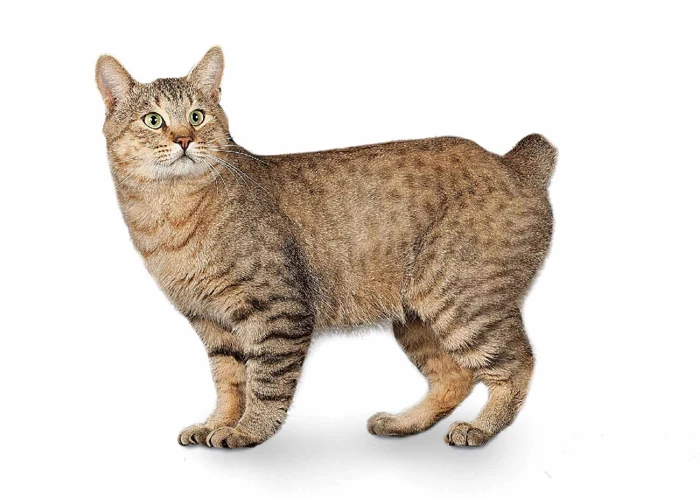
While the grain-free diet for American Bobtails has its fair share of benefits, it’s important to understand that it’s not without its drawbacks. It’s essential to consider all aspects before making a decision to switch your pet’s diet. Here are some potential downsides to a grain-free diet that you should take into account.
Expensive
One of the major concerns of pet owners when it comes to a grain-free diet for their American Bobtail cats is the cost. Grain-free cat foods tend to be more expensive than regular cat foods.
Reasons for the High Cost
There are several reasons why grain-free cat foods tend to be pricier. Firstly, the ingredients used are of higher quality, which means they cost more. The recipes for grain-free cat food are typically comprised of premium animal protein and healthy fats, which are important for maintaining optimal health in cats. In addition to this, manufacturers of grain-free cat foods usually have smaller production runs, which increases production costs. They also have to abide by strict FDA regulations when creating grain-free cat foods, which adds to the overall expense.
Is it Worth the Price?
While the cost of grain-free cat foods may be a disadvantage, the benefits of feeding your American Bobtail cat with a grain-free diet may far outweigh the cost. Many pet owners swear by the health benefits that their cats have experienced after switching to a grain-free diet. This includes improved digestion, healthier skin, and a shinier coat. The improved nutritional content of grain-free cat foods also means that your cat will need to eat less, which can offset the cost somewhat.
Alternatives to Commercial Grain-Free Cat Foods
If the cost of commercial grain-free cat foods is a concern for you, there are a few alternatives that you can consider. One option is to create your own cat food using high-quality, grain-free ingredients. This will give you total control over what goes into your cat’s food and could be a cheaper option in the long run. Another option is to mix commercial grain-free cat food with regular cat food to help offset the costs. You can gradually increase the amount of grain-free cat food in their diet as you see fit.
The cost of grain-free cat food should not be the only factor to consider when thinking about switching your American Bobtail cat to a grain-free diet. It is important to weigh the potential health benefits against the cost and determine whether it is worth the investment.
May lead to other Health Issues
Switching your American Bobtail cat to a grain-free diet may lead to some other health issues due to the absence of grains, which are a source of energy. Here are some possible health issues that may arise:
- Nutritional Imbalance: Grain-free diets may lack certain nutrients that are essential for your cat’s overall health. It is important to choose high-quality, balanced grain-free cat food that meets all of your cat’s nutritional requirements. Consult with your vet before making any major dietary changes for your cat.
- Kidney Problems: Some grain-free cat foods contain higher levels of protein and phosphorus, which can put added stress on your cat’s kidneys. Over time, this can lead to kidney damage or even kidney failure if not monitored properly.
- Heart Disease: Grain-free cat foods may also contain higher levels of taurine and methionine, which can lead to an increased risk of heart disease in some cats.
- Dental Problems: Some grain-free cat foods may be high in carbohydrates or contain alternative sources of carbohydrates that can stick to your cat’s teeth and cause dental problems like tartar buildup, gum disease, and tooth decay.
It’s important to keep in mind that while a grain-free diet may have some benefits for your American Bobtail cat, it’s not always the best option for every cat. It is essential to consult with your vet before making any dietary changes for your cat because they can recommend the best diet for your cat based on their individual needs and health requirements. Remember to choose high-quality, balanced grain-free cat food and monitor your cat’s health regularly to avoid any health issues that may arise due to a lack of grains in their diet.
Bland Taste and smell
One of the potential drawbacks of a grain-free diet for American Bobtail cats is the bland taste and smell of the food. Cats are notorious for being picky eaters and can be quite particular about the taste and smell of their food. This can be particularly challenging when transitioning to a new type of diet, such as a grain-free one.
Here are a few reasons why a grain-free diet might taste bland to your American Bobtail:
- The absence of grains can sometimes mean that there are lower levels of carbohydrates in the food, which can affect the overall taste and texture of the food.
- Grain-free diets often rely on other sources of protein, such as meat or fish, which may have a stronger taste and odor than grains. Some cats may find this taste overwhelming, while others may find it quite appealing.
- Because grain-free diets are often made with more natural and whole ingredients, there may be fewer additives or flavor enhancers in the food, which can make it taste more bland compared to processed foods.
But why is bland-tasting food a potential problem for American Bobtail cats?
Well, if your cat finds their food unappetizing, they may not eat enough of it to meet their nutritional needs. This could lead to weight loss, malnourishment and a range of other health problems. It can also cause your cat to become finicky and less willing to try new types of food in the future.
So, what can you do about it?
- Try different grain-free brands and flavors to find one that your American Bobtail enjoys. Just like humans, cats have different preferences, so it may take some trial and error to find the right food.
- Add a small amount of wet food to their diet to help improve the taste and texture of their dry food. This can be a great way to entice picky eaters to try new types of food.
- Consider introducing some natural flavor enhancers to their food, such as small amounts of tuna juice or chicken broth. This can help make their meals more appealing without compromising the health benefits of a grain-free diet.
It’s important to note that while a bland taste and smell may be a potential drawback of a grain-free diet, it’s not a reason to avoid this type of food altogether. The health benefits of a grain-free diet often outweigh any concerns about taste, and with a bit of experimentation, it’s usually possible to find a food that your American Bobtail will love.
Not Suitable for all Cats
While grain-free diets may offer numerous benefits, they are not suitable for all cats. It is essential to consider certain factors before switching to a grain-free diet for your American Bobtail cat. Here are some of the reasons why grain-free diets may not be suitable for all cats:
| Reasons | Details |
|---|---|
| High-Protein: | Grain-free diets usually come with high protein content, which may not be suitable for cats with underlying kidney problems. A high-protein diet may put a strain on the kidneys and lead to further health complications. |
| Weight Management: | Weight gain in cats is a common concern. Grain-free diets may contain more calories and may not be suitable for cats that require a calorie-restricted diet. Switching to a high-calorie diet may lead to obesity and other related health complications. |
| Availability: | Grain-free diets may not be widely available in all areas, making it challenging to find the right food options for your cat. This may require more effort and may be more expensive than other types of diets. |
| Allergies: | Although grain-free diets are designed to prevent allergies, they may contain other ingredients that may cause allergic reactions. A food elimination trial may be required before switching to a grain-free diet to rule out any possible allergies. |
It is crucial to consult with your veterinarian before switching to a grain-free diet. Your veterinarian can help determine if a grain-free diet is suitable for your American Bobtail cat based on their individual health concerns and nutritional requirements. While switching to a grain-free diet may offer some benefits, it is essential to consider the potential drawbacks to ensure the best possible health outcome for your furry friend.
Things to consider before switching to Grain-free diet
Switching your American Bobtail cat to a grain-free diet is a big decision that requires careful consideration. Before making the switch, there are several important factors to take into account to ensure that the new diet is appropriate for your furry friend. In this section, we will explore the key things to consider before switching to a grain-free diet for your American Bobtail cat, including consulting with your vet, choosing high-quality cat food, and making a gradual transition.
Consult with your Vet
Before switching your American Bobtail cat to a grain-free diet, it’s important to consult with your vet to ensure it’s the right choice for your furry friend. Here are some reasons why consulting with your vet is crucial before making the switch:
- Existing Medical Conditions: Your cat’s vet understands their medical history and any ongoing conditions. It’s important to discuss with them whether a grain-free diet may impact any existing conditions your American Bobtail may have.
- Dietary Needs: Each cat has their unique dietary needs, and a vet can help determine whether a grain-free diet is appropriate for your American Bobtail. They may also recommend a particular brand or type of grain-free food that will best suit your cat’s needs.
- Potential Risks: Switching to a grain-free diet can sometimes be risky, and your vet can help you weigh the pros and cons. They will inform you of any risks associated with the switch, such as nutrient deficiencies or digestive issues, and help you make the right decision for your cat.
Consulting with your vet can not only help you make an informed decision about whether a grain-free diet is suitable for your American Bobtail, but it can also prevent any potential harm to their health. Make sure to consult with your vet before making any major changes to your cat’s diet.
Choose High-Quality grain-free Cat foods
When choosing a grain-free diet for your American Bobtail cat, it is important to select high-quality cat food options to ensure your pet receives all necessary nutrients. Here are some factors to keep in mind when choosing grain-free cat food:
| Ingredients | Check the ingredients of the cat food you are considering. It should not contain grains, wheat, soy or corn. Look for high quality proteins like chicken, fish or lamb as the first ingredient. Avoid fillers like meat by-products, artificial flavors or colors. |
| Brand Reputation | Choose a brand with a good reputation and one that has been in the market for a while. Research the company’s track record and reviews of other pet owners before making a purchase. |
| AAFCO Approved | Make sure the cat food has approval from AAFCO, which stands for Association of American Feed Control Officials. This organization ensures that pet food meets the necessary nutritional requirements for your cat. |
| Nutritional Value | Check the nutritional value of the cat food, including protein, fat and other essential vitamins and minerals. Remember that nutritional needs vary depending on the age and activity level of your cat. |
| Price | While grain-free cat food can be more expensive, it is important to find a balance between quality and price. Don’t sacrifice quality for cost, but don’t overspend if it doesn’t fit your budget. |
By considering these factors, you can select a high-quality grain-free cat food that will provide your American Bobtail with a balanced and healthy diet. Remember, it is always important to consult with your veterinarian before switching to a new diet to ensure it is appropriate for your cat’s individual needs.
Gradual Transition
Switching your American Bobtail cat to a grain-free diet requires a gradual transition for the best results. Abruptly changing your cat’s diet can lead to digestive problems and discomfort. It’s essential to introduce the new diet slowly, giving your cat’s digestive system time to adjust.
Here are the recommended steps for a gradual transition:
- Step 1: Start by mixing a small amount of grain-free food into your cat’s current diet. Begin with a ratio of 25% grain-free food to 75% regular food.
- Step 2: Over the next few days, gradually increase the proportion of grain-free food. For example, 50/50 on day two, 75/25 on day three, and 100% grain-free food by day four or five.
- Step 3: Monitor your cat’s feeding behavior and overall health during the transition period. If you notice any signs of discomfort, such as vomiting or diarrhea, slow down the transition process and maintain the current ratio for a few more days before increasing the amount of grain-free food.
- Step 4: Once the transition is complete, ensure that your American Bobtail cat is consuming the right amount and type of grain-free food.
Gradual transition is critical because it helps your cat’s digestive system gradually adapt to the new diet. Also, it allows your cat to get used to the new food’s taste and smell. Additionally, it reduces the chances of your cat rejecting the new diet. With a gradual introduction, your cat is more likely to accept the change, and this is essential for maintaining a healthy diet for your furry friend.
Conclusion
After considering the pros and cons of a grain-free diet for American Bobtail cats, it is crucial to make an informed decision before switching your pet’s food. While there are certain benefits such as preventing allergies, maintaining healthy skin and coat, and improving digestion, there are also potential drawbacks, including the high cost and the possibility of developing other health issues. Therefore, it is essential to consider various factors before transitioning to a grain-free diet.
Firstly, it is recommended to consult with your veterinarian to determine if a grain-free diet is necessary for your American Bobtail cat. They will be able to assess your pet’s current health condition and determine whether a grain-free diet will have any adverse effects. It is especially important to seek veterinary advice if your cat has any existing medical conditions or allergies.
Secondly, it is crucial to choose high-quality grain-free cat foods. Reading the ingredients label thoroughly to ensure your cat still gets all of the necessary nutrients, such as protein, vitamins, and minerals, is essential. Not all grain-free pet foods are created equal, so do your research and consider the brand’s reputation, reviews, and certifications.
Lastly, it is essential to transition your cat to a grain-free diet gradually. Abrupt changes in diet can lead to gastrointestinal distress, so slowly incorporate new foods into your cat’s existing meals. Gradual change will also give your cat time to adjust to the new taste and smell of the food.
Overall, a grain-free diet for American Bobtail cats can provide many benefits, but it is crucial to make an informed decision by considering various factors like your cat’s health, nutritional needs, and brand quality. Once the decision is made to switch to a grain-free diet, a gradual transition will help your cat adjust to the new diet comfortably. By taking these steps, you can provide your American Bobtail with a healthy and nutritious diet that can help maintain optimal health and wellness.
Frequently Asked Questions
What is the main difference between grain-free and regular cat food?
Grain-free cat food does not contain any grains like wheat, corn, or barley, which are commonly used in regular cat food as a source of carbohydrates.
Is grain-free cat food suitable for all cats?
No, grain-free cat food is not suitable for all cats as some cats may have specific dietary requirements or medical conditions that require certain types of food. Consult with a vet before making any dietary changes.
Can grain-free cat food cause any health issues?
Grain-free cat food may lead to health issues such as nutritional imbalances, weight gain, and constipation if not chosen and transitioned to properly.
Why is grain-free cat food more expensive than regular cat food?
Grain-free cat food typically contains higher quality ingredients and are formulated to meet specific dietary needs, which can lead to a higher prices compared to regular cat food.
What are the key benefits of grain-free cat food for American Bobtail cats?
The major benefits of grain-free cat food for American Bobtail cats include preventing allergies, maintaining healthy skin and coat, improving digestion, and managing weight.
How do I know if my American Bobtail cat requires a grain-free diet?
If your cat is experiencing skin or coat issues, digestive problems, or other health issues related to diet, consult with a vet to see if grain-free food is recommended.
What can I do to ensure that my American Bobtail cat likes the taste of grain-free cat food?
Gradually introduce the new food and mix it with the old food to give your cat time to adjust. Offer a variety of textures and flavors to find the one that your cat likes the most.
Is it necessary to consult with a vet before switching to grain-free cat food?
Yes, it is always recommended to consult with a vet before making any major dietary changes to ensure that your cat’s specific dietary needs and any health issues are taken into consideration.
What types of cat foods are gluten-free?
Cat foods that are made with alternative sources of carbohydrates, such as potatoes, peas, or sweet potatoes, are typically gluten-free. These can be found in both grain-free and regular cat food options.
Can grain-free cat food help my American Bobtail cat lose weight?
Yes, grain-free cat food can help manage your cat’s weight by providing high-quality protein sources and reducing the amount of fillers that can lead to weight gain. Consult with a vet to find the best weight management plan for your cat.

